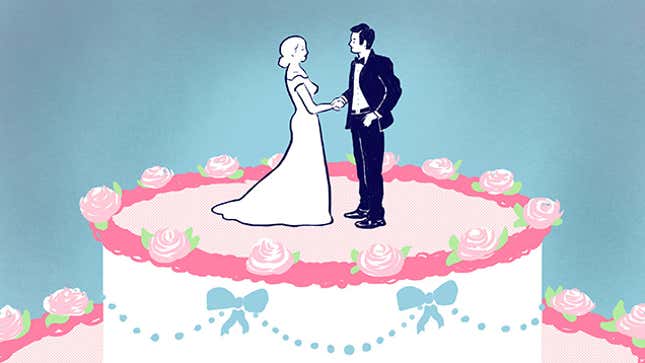How to Make Your Wedding Vows More Realistic
Latest

Marriage: Is it better if you wait? Is it better if you never do it in the first place? Should it be changed to a two-year contract, subject to renewal? Or should divorce simply be embraced, since it’s inevitable for so many? New option: Be brutally realistic about what it’s actually like up front.
There’s a lot of conflicting information out there about what leads to greater marital happiness and longevity, but at the core of all these questions and ponderings is one notion: Society has changed — why hasn’t marriage? Isn’t there a better way to do this thing? We’ve certainly toyed with ideas about changing the institution itself, from treating it like a short-term contract subject to renewal (every two years, or five, or 10, or 20) to treating like more of an actual contract, and spelling out, say, who will do what chores, or how many children will be had, to how much sex each partner “expects.”
Two recent pieces on the state of marriage offer an intriguing other suggestion: Changing the narrative to reflect that marriage is hard, and great marriages are rare, and to alter the wedding vows accordingly. Less “I promise to love you forever” and more “I promise to love you as long as you don’t fall in love with my best friend.” (No, this isn’t another “Shadow Wedding.”)
In a piece over at Quartz exploring this idea, Danielle Teller acknowledges the problem: We marry for love now, but our social narratives have simply not caught up. We still feed children stories of happily ever after, and many of us believe them, too, but we all know married couples who aren’t happy, and what is to be done? Teller asks:
How should we, as a society, react to married people who feel that they have not found happily-ever-after? We could stick with our original narrative and tell them, “That’s a bummer that you haven’t found your true love yet. You should try again.” That would lead to a lot more divorces, however, and we don’t like divorces.
She concludes that while it isn’t exactly the cheeriest notion to slap on a wedding invite, something like this might be a better societal message about marriage:
The painful truth is that really great marriages exist, but they are rare. What we as a society should probably be telling married people is, “If you have love, passion, companionship and equality in your marriage, you are wealthy beyond words. If you don’t, you have two choices. You can decide that your marriage is the best you’re going to get and try to be content. Alternatively, you can leave your marriage to play the lottery of finding that perfect partner, accepting that you are unlikely to win and may have to stay single for the rest of your life.”
Or a good third option I think would be to fake your own death try to problem-solve your way to a better relationship. But honestly, even the notion of a great marriage is a complex thing. Take Charles and Ray Eames. He was an architect; she was a painter. They were both designers, and artists, and they made that famous chair, and as this documentary explores, they spent their lives working and archiving and building and dreaming and making, and they seemed to not only genuinely enjoy each other’s company, but actually worked, and lived, and breathed, and ate and tirelessly did all the things together. While married! Like, constantly! Later on, he totes cheated on her though. Is that marriage “great” or not? You tell me. Helluva chair, though!
In a separate piece on marriage vows, Teller explores what it would be like for vows to better reflect this complexity:
If the modern wedding contract states or implies undying love, how do we reconcile that with the reality of our relationships? Nobody would ever sign an employment contract that said, “I not only promise never to leave this job, but I promise to be equally enthusiastic about working here for the rest of my life, no matter how this job evolves and no matter how much I change as a person.” Yet this is more or less what most of us do when we get married. We promise that we are going to continue to feel the way we do today in perpetuity, even though experience teaches us that our feelings about most things change over time.
How does one love another forever if they’ve lost that loving feeling? What if, she asks, vows read more like this:
“I, ____________________, do promise to act as though I love you, __________________, for as long as I shall live. I promise not to leave you under any circumstance, no matter how miserable it makes me to stay with you.”
A smidge unrealistic. How about:
-

-

-

-

-

-

-

-

-

-

-

-

-

-

-

-

-

-

-

-

-

-

-

-

-

-

-

-

-

-

-

-

-

-

-

-

-

-

-

-








































